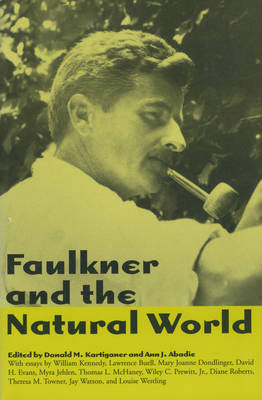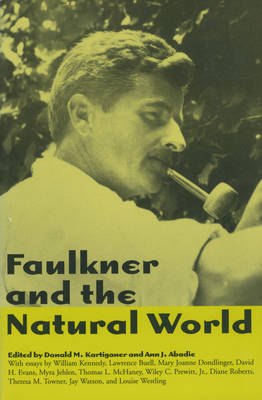
- Retrait gratuit dans votre magasin Club
- 7.000.000 titres dans notre catalogue
- Payer en toute sécurité
- Toujours un magasin près de chez vous
- Retrait gratuit dans votre magasin Club
- 7.000.0000 titres dans notre catalogue
- Payer en toute sécurité
- Toujours un magasin près de chez vous
Faulkner and the Natural World
55,95 €
+ 111 points
Description
Scholarly probings that find the heart of nature in the Nobel Prize author's works Although he belonged to an American generation of writers deeply influenced by the high modernist revolt "against nature" and against the self-imposed limits of realism to a palpable world, William Faulkner reveals throughout his work an abiding sensitivity to the natural world. He writes of the big woods, of animals, and of the human body as a ground of being that art and culture can neither transcend nor completely control. The eleven essays that make up this volume, including a paper written by the acclaimed novelist William Kennedy, explore the place of "the unbuilt world" in Faulkner's fiction. They give particular attention to the social, mythic, and economic significance of nature, to the complexity of racial identity, and to the inevitable clash of gender and sexuality. These essays were presented in 1996 as papers at the Faulkner and Yoknapatawpha Conference, held annually at the University of Mississippi. Included are the following: Lawrence Buell's "Faulkner and the Claims of the Natural World"; Thomas L. McHaney's "Oversexing the Natural World"; Theresa M. Towner's "Color, Race, and Identity in Faulkner's Fiction"; Jay Watson's "The Art of the Literal in Light in August"; Mary Joanne Dondlinger's "The Matter of Race and Gender in Faulkner's Light in August"; Louise Westling's "Sutpen's Marriage to the Dark Body of the Land"; Myra Jehlen's "Faulkner and the Unnatural"; Diane Roberts's "Eula, Linda, and the Death of Nature"; David H. Evans's "'The Bear' and the Incarnation of America"; Wiley C. Prewitt, Jr.'s "Hunting and Habitat in Yoknapatawpha"; and William Kennedy's "Learning from Faulkner: The Obituary of Fear." Donald M. Kartiganer, Howry Chair of Faulkner Studies in the Department of English, and Ann J. Abadie, Associate Director of the Center for the Study of Southern Culture, teach at the University of Mississippi.
Spécifications
Parties prenantes
- Editeur:
Contenu
- Nombre de pages :
- 264
- Langue:
- Anglais
- Collection :
Caractéristiques
- EAN:
- 9781578061211
- Date de parution :
- 01-05-99
- Format:
- Livre broché
- Format numérique:
- Trade paperback (VS)
- Dimensions :
- 151 mm x 228 mm
- Poids :
- 417 g

Les avis
Nous publions uniquement les avis qui respectent les conditions requises. Consultez nos conditions pour les avis.





